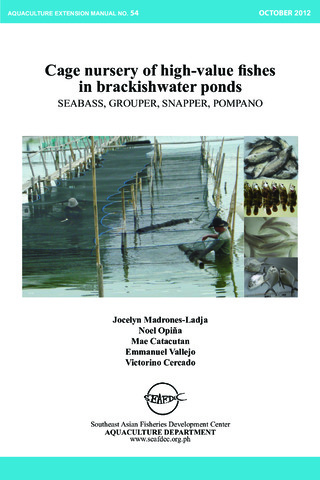Comparative analysis of pattern of fishcage culture using marine/brackish water in three Southeast Asian countries
| dc.contributor.author | Matsuura, Tsutomu | |
| dc.contributor.editor | Nakamura, Koji | |
| dc.coverage.spatial | Philippines | en |
| dc.coverage.spatial | Thailand | en |
| dc.coverage.spatial | Malaysia | en |
| dc.coverage.spatial | Southeast Asia | en |
| dc.date.accessioned | 2023-08-29T02:23:12Z | |
| dc.date.available | 2023-08-29T02:23:12Z | |
| dc.date.issued | 2007 | |
| dc.identifier.issn | 1341-710X | |
| dc.identifier.uri | http://hdl.handle.net/10862/6473 | |
| dc.description.abstract | Production by fishcage culture using marine/brackish water has increased drastically since the mid-1980s, when the technology for developing sea bass hatchery fry was established. In the 1990s, it grew further, due to the start of production of grouper and snapper hatchery fry. We conducted a comparative analysis of production by fishcage culture and patterns of fishcage culture in the Philippines, Thailand, and Malaysia, all of which are major producer of fish by fishcage culture using marine/brackish water in the Southeast Asian countries. We compared of fishcage culture management between the reference and current year and analyzes the average of the reference year (the year when fishcage culture started; the same hereinafter) and current year (2004). In terms of production of cultured fish by kind, sea bass showed a more than 50% decrease - from 67% to 32%, whereas grouper saw a nearly doubled ratio from 20% to 39%. Snapper remained almost the same, at 29% to 28%. Other fish (mainly rabbitfish, threadfin bream and grunter) saw an increased ratio from 5% to 16%. We compared the management of fishcage culture between the reference year and 2004. We looked into the ratio of production by type of fish and found that sea bass showed a decreased ratio to less than half from 67% to 32%; while grouper showed a near doubling of its ratio from 20% to 39%. Snapper remained almost unchanged, at 28% to 29%; and other kinds of fish increased their ratios from 5% to 16%. In terms of operating cost per kilogram for farming groupers, fishcage culture costs more than fishpond culture. Fishcage culture, however, is more convenient and productive than fishpond culture, and requires lower initial cost than fishpond culture, since the former does not require an initial outlay for constructing a pond or management of water quality. Accordingly, fishcage culture shows overwhelmingly higher production than fishpond culture. | en |
| dc.description.sponsorship | This study is the result of a collaboration among the Japan International Research for Agricultural Science (JIRCAS), the Southeast Asian Fisheries Development Center/ Aquaculture Department (SEAFDEC/AQD) of the Philippines, Kasetsart University and SEAFDEC/ Secretariat in Thailand, and the Fisheries Research Institute (FRI) in Malaysia. The questionnaire forms were made in collaboration with SEAFDEC/AQD. | en |
| dc.language.iso | en | en |
| dc.publisher | Japan International Research Center for Agricultural Sciences | en |
| dc.relation.ispartofseries | JIRCAS Working Report; No. 56 | |
| dc.subject | sea bass | en |
| dc.subject | groupers | en |
| dc.subject | snappers | en |
| dc.subject | Lates calcarifer | en |
| dc.subject | Epinephelus | en |
| dc.subject | Lutjanus | en |
| dc.subject | Chanos chanos | en |
| dc.subject | fishery production | en |
| dc.title | Comparative analysis of pattern of fishcage culture using marine/brackish water in three Southeast Asian countries | en |
| dc.type | Book chapter | en |
| dc.citation.spage | 135 | en |
| dc.citation.epage | 143 | en |
| dc.citation.bookTitle | Sustainable Production Systems of Aquatic Animals in Brackish Mangrove Areas (2005) | en |
| dc.subject.asfa | fish cages | en |
| dc.subject.asfa | sea bass culture | en |
| dc.subject.asfa | brackish water | en |
| dc.subject.asfa | comparative analysis | en |
| dc.subject.asfa | grouper culture | en |
| dc.subject.asfa | snapper culture | en |
| dc.subject.asfa | pond culture | en |
| dc.subject.asfa | cage culture | en |
| dc.subject.asfa | aquaculture | en |
| dc.subject.scientificName | Lates calcarifer | en |
| dc.subject.scientificName | Epinephelus | en |
| dc.subject.scientificName | Lutjanus | en |
| dc.subject.scientificName | Chanos chanos | en |
| local.subject | fishcage | en |
| local.subject | culture management | en |
| local.subject | sea bass | en |
| local.subject | grouper | en |
| local.subject | snapper | en |
Files in this item
| Files | Size | Format | View |
|---|---|---|---|
|
There are no files associated with this item. |
|||
This item appears in the following Collection(s)
-
Books and Book Chapters [123]



